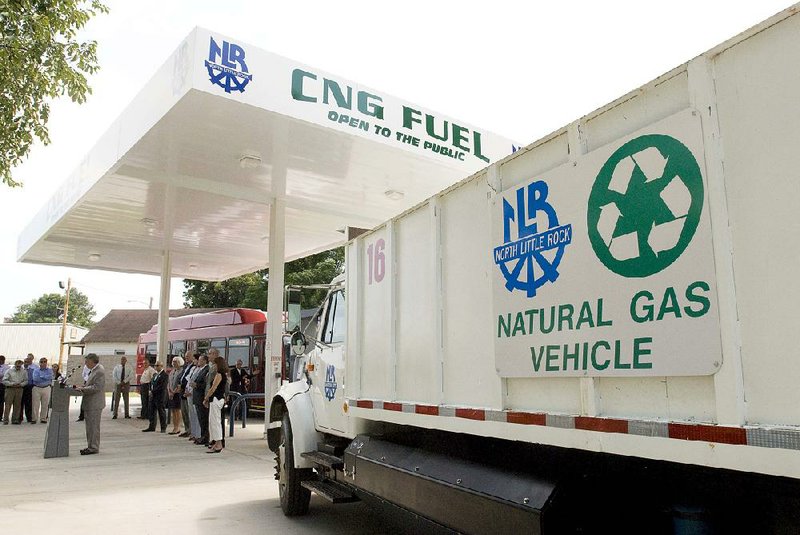Constant repairs, vandalism and repeated shutdowns at North Little Rock's city-operated compressed natural gas station have city officials pondering whether to pump more money into the station, sell it or shut it down.
"It's not doing as well as we'd want," Mayor Joe Smith told city aldermen last week. "After the first of the year, there's a really good chance we'll have to make some big decisions to spend the money to update it, or mothball it."
North Little Rock's station, at the southwest corner of Curtis Sykes Drive and North Olive Street, about a block west of Interstate 30, opened in August 2011 as the only city-owned, publicly accessible compressed natural gas station in Arkansas. Little Rock followed with its own station in April 2014.
North Little Rock used $225,469 in city funds for its share of the $725,469 construction cost, plus another $32,750 to buy four parcels of land on which to build it -- a total of $258,219 in city taxpayer money. The remaining money came from state and energy company grants.
The city also received a $150,000 Arkansas Department of Environmental Quality grant to convert three garbage trucks from diesel fuel to run on compressed natural gas soon after the station opened.
Now, selling the station to a company to take it off the city's hands seems likely, unless the City Council agrees to spend an estimated $250,000 to "overhaul" it and keep it going, city Chief of Staff Danny Bradley said.
"We struggle with it," Bradley said in an interview Thursday. "It is in need of some fairly major overhaul."
The city has, over the years, bought or retrofitted 15 vehicles that run on compressed natural gas -- including nine Ford Tahoes for the Police Department -- specifically to be customers of the station.
Also, there are companies in the city that have compressed natural gas fleets that depend on the station, as well as travelers passing through who depend on refueling there, Bradley said.
Through Thursday, year-to-date revenue from the compressed natural gas station was $87,868 and expenses were $64,786.86, city Finance Director Karen Scott said. Revenue production was good at the beginning of the year, she said, but "almost nonexistent" last month when the station was basically shut down.
Both pumps were working Thursday, Bradley said, but the pumps' function "depends on what day it is."
"It's been in constant repair for almost four years now," Bradley said. "We've had the manufacturer in multiple times to repair it. Three years ago, a dispenser went out, and we replaced all of the dispenser system.
"We need some direction from the City Council on whether they want to make an investment in the station or sell it," Bradley said. "I don't see the City Council just voting to abandon it, but it's an option they can consider."
Kenny Brock, the city's director of vehicle maintenance, whose department oversees the compressed natural gas station, said a "design flaw" in the compressors causes problems, but there are other problems with the electronic automation system that controls pressure, monitors and valves. The station is self-serve, with no onsite manager.
"It hasn't been reliable from the beginning," Brock said of the station's operation. "When the station was put in, the program that they have operating the automation was wrong, and the person who put it in could never fix it. I've spent a lot of time researching and reprogramming it."
The city originally planned for a larger compressor that would be more efficient for fueling vehicles, but it saved money by installing two smaller compressors instead, after the city received a higher estimate for the station's construction cost, city officials said in a Dec. 29, 2010, Arkansas Democrat-Gazette article.
"Vandalism is another problem, especially at night," Brock said. "People come by and hit the emergency stop. If that's triggered, the station is shut down and it can't be turned back on remotely. That happens quite often. Someone has to go down there and turn everything back on and reset it. Sometimes [vandals will] break the glass, steal the fire extinguisher or rip the hoses."
City officials have already talked with a company about possibly buying the station. In May, American Natural Gas bought two compressed natural gas stations in Conway and Damascus from Southwestern Energy. No price or reason for the sales was given at the time, according to a news article about it. The Damascus station opened in May 2011 and the Conway station in 2013.
"At least one company is buying up CNG stations," Bradley said. "They bought the Damascus station at a deep discount, from what I understand. Our initial answer to them to buy it was that we gave them a price of $300,000. We didn't hear back from them."
The North Little Rock station was a project forwarded by former Mayor Patrick Hays, who left office in 2013. When the city dedicated the station in August 2011 with much fanfare, about 90 people attended, mostly city officials, natural gas company representatives and officials from companies with compressed natural gas fleets.
Compressed natural gas had been popular as a less expensive fueling alternative, but with the price of gasoline and diesel fuel having dropped since, the price gap has significantly narrowed.
"With petroleum prices having gone down, there's not as much financial benefit to run CNG," Bradley said.
Metro on 11/20/2016
